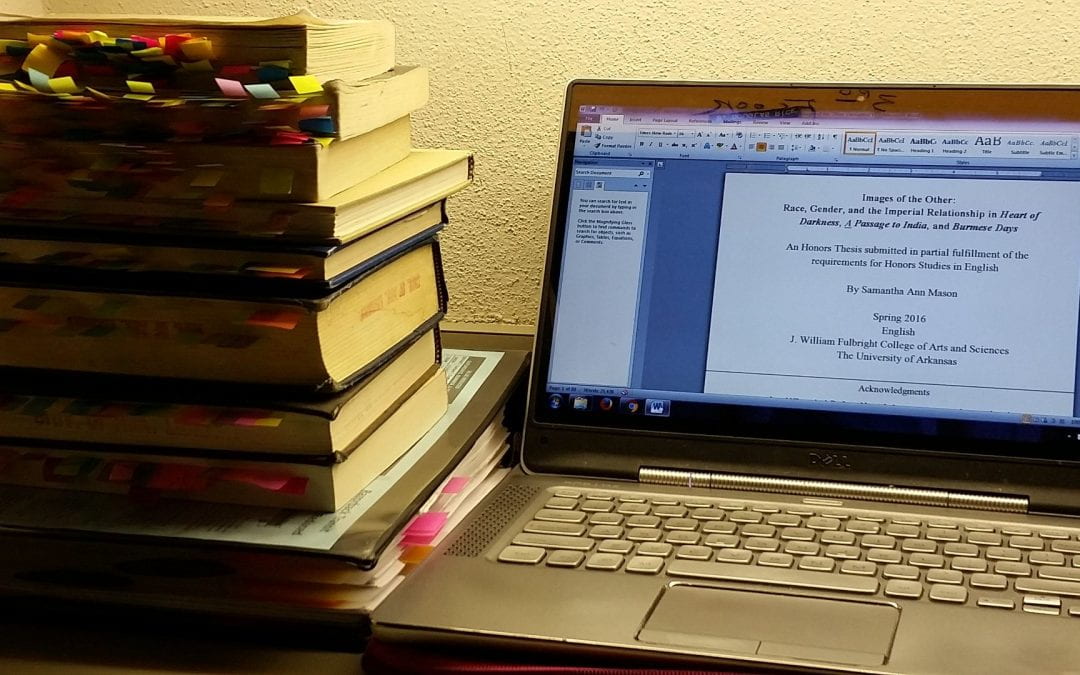Sammi Mason
The last few weeks have brought major changes to the University of Arkansas community. All classes have been moved online for the rest of the semester, the majority faculty and staff are working from home, and most students living on campus will leave before April 3rd, if they have not left already. There is no doubt that these changes are painful for students, especially seniors, who have seen many of their last events cancelled or postponed indefinitely. Our campus community and the larger world are facing unprecedented circumstances.
And in the midst of all of this, you are preparing for your thesis defense.
I have written before on the impact my own thesis defense in 2016 had on me. It felt like the culmination of my undergraduate experience, it was exciting to speak about my independent research to faculty and staff, and it solidified my desire to go to grad school to further my research. I hope with everything I have that you can find a similar experience in your thesis defense, but it would be ridiculous to ignore the obvious differences between our thesis defense experiences. Some advice from my first piece will stay the same: you should still avoid procrastinating during the writing process and leave time for in-depth revision before turning in your thesis. But some advice, by necessity, must change with the times.
So here is my best advice about how to effectively defend your thesis (remotely).
1. Decide how you are going to defend NOW.
Do not wait until the week before the defense to start planning how you are going to defend your thesis. Take it from the people who defended their thesis the week before spring break—making new plans with less than a week’s notice is difficult. Avoid that stress by making a plan with your thesis advisor now. Direct them to the For Thesis Advisors page of the Fulbright Honors website for more detailed descriptions of the remote defense options.
You will have two basic options for defending your thesis remotely: a virtual meeting, or the “non-virtual option,” which will be achieved through email. The virtual meeting is a regular thesis defense conducted remotely. The virtual meeting can be achieved through whatever software you and your advisor see fit—from Microsoft Teams to a simple conference call function on your cell phone—just make sure you decide upon the meeting method before your advisor reaches out to the committee.
If you choose the non-virtual option, which imitates more of a comprehensive exam format, make sure you are clear on the specific deadlines you and your committee need to follow in order to complete the defense on-time. Your committee will send you their questions by 9 a.m. the day before the defense, which you will compile into a single document (Word or PDF are the best options here, since all faculty will have access to these file formats) and send your answers to the committee by 8 p.m. the day before your defense. Know that with the non-virtual option, you will be doing most of the work the day before your defense, while your committee will meet virtually during your scheduled defense time.
2. Create your own thesis timeline.
Familiarize yourself with the timeline laid out on the For Students Defending page of the Fulbright Honors website. Just like the Thesis Checklist outlined all of the major deadlines for Forms A, B, and C, this section of the website gives you a detailed timeline of what you need to do, from now until Dead Day. Use this timeline and adapt it to your own thesis defense date, then stick to it! Whether it’s a paper planner or a series of alarms on your phone, make sure you are doing everything you can to meet your thesis deadlines.
Some major points you need to address as soon as possible:
- Get the cell phone numbers of everyone on your committee and share them with the other committee members. These will be used in case of emergency.
- Once your thesis advisor and committee have agreed to a defense method, let the Fulbright Honors office know by emailing Mary Ellen Hartford at mhartfo@uark.edu.
3. Keep in mind: Your thesis is due A WEEK BEFORE your defense date.
You should send your complete thesis via email to all four of your committee members one week before the defense. This is where the “don’t procrastinate” advice comes in. Give yourself plenty of time to write and revise before your thesis is due to the committee. Aim to complete a full draft of your thesis at least one week before you need to turn your thesis in to the committee, at least two weeks before your scheduled defense. This will give you time to get feedback from your advisor, make any final changes, and avoid pulling an all-nighter trying to wring a passable introduction and conclusion out of your exhausted brain (not that I’m speaking from experience or anything).
4. Practice, practice, practice.
The day after you turn in your thesis, read through what you turned in and take notes of any details you think could be clearer, any minor errors you will need to correct, or any questions you could foresee your committee asking. Once you have made notes of questions your committee might ask, PRACTICE answering these questions. Practice with friends, with family, with your dog—whoever is around to listen. Write out any opening statement you plan on sharing and then rehearse. Use your visual aids, if you have them. Use any meeting software at least twice before the scheduled defense so you can get the hang of this. This is doubly true if you are planning on screen sharing.
One of the most beneficial things I did while preparing to defend my undergraduate thesis was getting a group of 5-6 friends together to hold a mock thesis defense. We reserved a conference room, everyone took a turn presenting, and then the group asked them a few questions.
While campus closures mean that you cannot do this in-person, you can do this virtually! Better yet, use the software you plan to use during your actual defense to make sure you are familiar with it!
If you have chosen the non-virtual (email) defense option, it still would be beneficial to practice your answers to potential questions out loud with friends and family. If you have already thought through some of your answers, you will be better equipped to get your answers down quickly and clearly on the day before your defense when you respond to committee questions.
5. After the defense, celebrate!
Once you have finished, celebrate however you can. You defended your thesis! And that’s always an accomplishment, no matter how you do it.
Want more information about the policies and procedures in place for defending your thesis during the COVID-19 outbreak? Visit the COVID-19 Precautions section of the Fulbright Honors website. You can also reach our (remote) office directly Monday – Friday, 8:00 am – 4:30 pm at 479-575-2509 or arschnrs@uark.edu.


